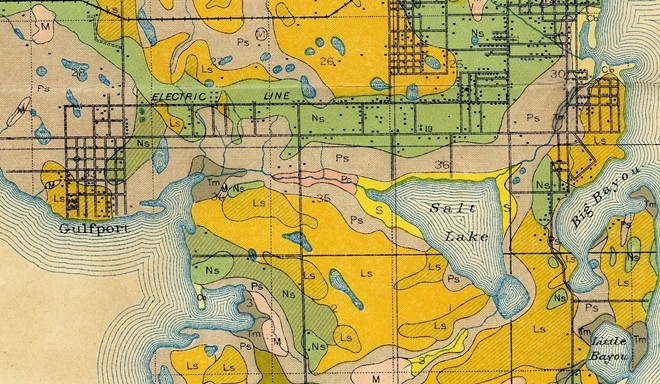
1914 map of Salt Creek c/o Thomas Hallock
Salt Creek is a neglected ditch that runs through the heart of south St. Petersburg.
Politics had trumped environment. Or even common sense. With a Cat-5 catastrophe fresh in memory, Florida voters re-installed a Senator who (until recently) denied the very existence of climate change. We re-elected a governor, soon to be presidential candidate, who promises to do little for the causes of sea level rise. Ron DeSantis touts resilience but remains in the back pocket of the oil and gas industries. (Stock up on fire extinguishers, he says, but ignore the faulty wiring.) The League of Conservation Voters gives Marco Rubio an abysmal 7 out of 100 on its environmental scorecard. Where the losing senatorial candidate Val Demings received an A-grade (97%), the victorious DeSantis (LCV, 2%) baitingly mocks the "pews of the global warming left."
Moderate to liberal Floridians have good cause to feel cynical about civil discourse.
St. Pete, however, does offer promise. Pinellas County is a peninsula on a peninsula, and the scale shrinks public conversation to human size. I have bumped into multiple mayors in our city parks. To live in St. Petersburg is to have a selfie with Charlie Crist on your cell phone.
Reactionary Floridians have stormed the U.S. Capitol. They attack police (the very blue they claim to back) and shut out facts that do not align with their opinion. In St. Petersburg, to witness public life, I pass through a metal detector, walk up the steps, nod to the blank mural (rightly removed by Omali Yeshitela) in history's stairwell, and grab a seat.
I was there with Darden Rice, the current president of Friends of Salt Creek, a community group formed at the encouragement of council co-chair Gina Driscoll. Salt Creek is a neglected ditch that runs through the heart of south St. Petersburg. Darden, who knows how government works, had a genius idea: get Salt Creek declared a "Waterway of Cultural and Environmental Importance."
A feel good measure, for sure, but strategically smart.
We waited three hours for our turn to speak. If you've never sat through a City Council meeting, I recommend you do so. I watched our elected officials rubber stamp zoning changes, broker between parties who disagreed parties over the landmark Manhattan Casino, and implore a developer to rethink parking on already congested Central Avenue. Most of these issues needed a side room and a stern kindergarten teacher, telling the kids to get along.
By the time we reached our item, the last of the evening, council members were visibly exhausted.
We each took our turn: Darden, Jenna Byrne with the Water Warrior Alliance, and Michael McGrath with the Sierra Club.
I timed my three minutes at the podium carefully, taking council members on an imaginary canoe trip across the Pinellas Peninsula. We started at USF, entering Salt Creek from Bayboro Harbor. We passed under Thrill Hill, through the unexpected wilderness in Bartlett Park, and over the dam at Lake Maggiore (traveling in our imaginary vessels). After a short portage, from 31st Street S to the parking lot behind Skyway Jacks diner, we drifted from a retention pond into Clam Bayou, completing our journey at the Gulfport Casino.
The beauty of Salt Creek and Clam Bayou, which join up on a topo map, is precisely the connection. All kinds of people have a stake: golfers, home owners, Friends of Boyd Hill, rich and poor, homeless and boaters. This creek traces through a fractured community, linking us across our differences."This creek traces through a fractured community, linking us across our differences."
tweet this
Why can't we do the same? Like nature, come together?
City Council voted, our measure passed unanimously, and after the last gavel bang, I latched onto a post-meeting round of drinks. To my happy surprise, I learned that a City Council member—on a different side of the political fence—can also be a drinking buddy. The Democrats have wine, the Republican drinks beer, but the sides agree on Bangkok shrimp.
I sat across from Ed Montanari, a retired American Airlines pilot, known for holding down the city's conservative front. Politically, Montanari and I do not fall on the same page.
But we still can chat. The pilot and I talked about flying into Tampa International Airport, banking over Pinellas County, and how St. Pete's Lake Maggiore resembles a little Okeechobee from the air. We speculated how the lakes might have served a similar function: as reserves for sheet flow at the base of a peninsula.
We traded pictures of our dogs. My partner Julie and I have a Norwegian Buhund, which is like a German Shepherd, but smaller; Montanari is the pet parent of a shepherd named Jet.
Common interests supplant caricature.
The 45th president taught our nation an important fact. As long as our elected officials remain hostage to extremists, the process will not function. The one-party state of Florida, far right of center, courts disaster. We need public houses. We need conversation.
Our small group had finished our drinks. A meeting that opened in late afternoon had closed well into the night. There were dogs in need of walking. We paid the bill, shook hands and hugged, said we hoped to talk again soon. We meant what we said.
Then we went home.
Thomas Hallock is Professor of English and Florida Studies at the University of South Florida. He and Amanda Hagood anchor CL's #Creekshed project, writing about urban waterways.

